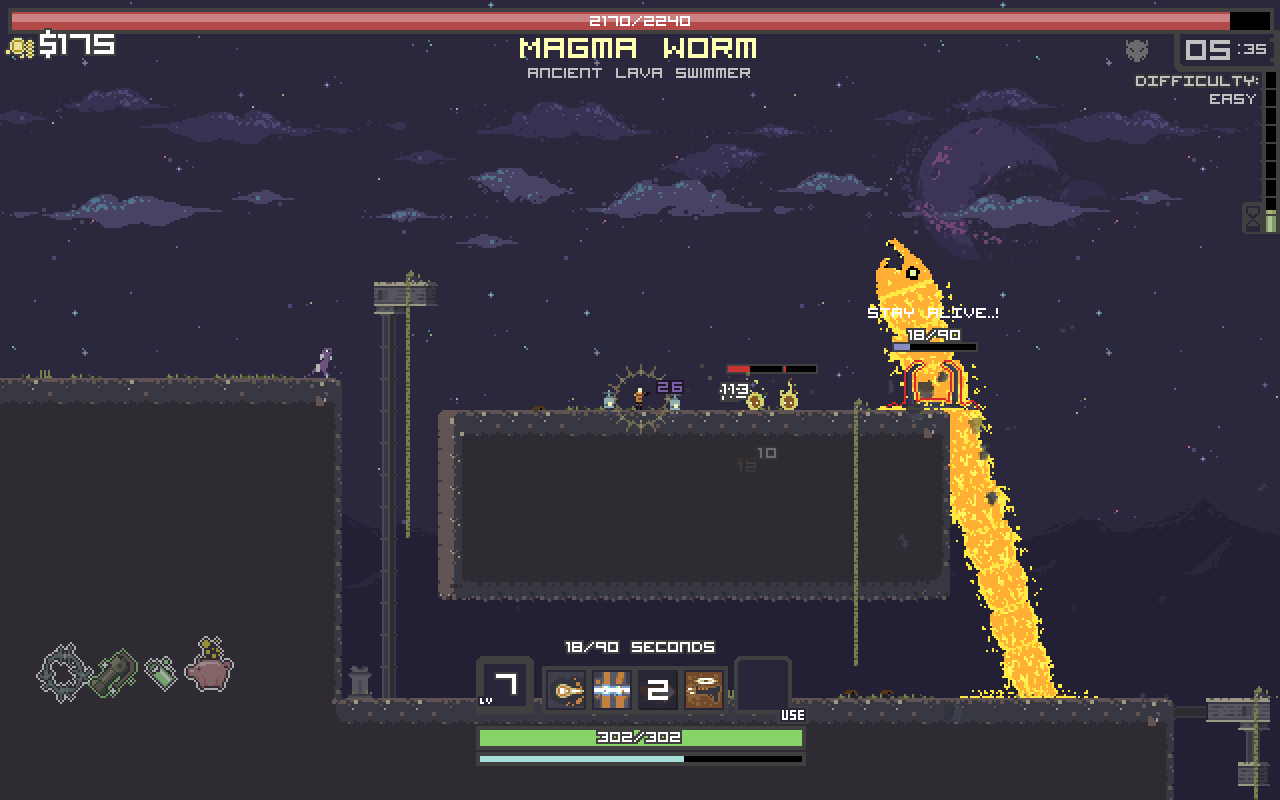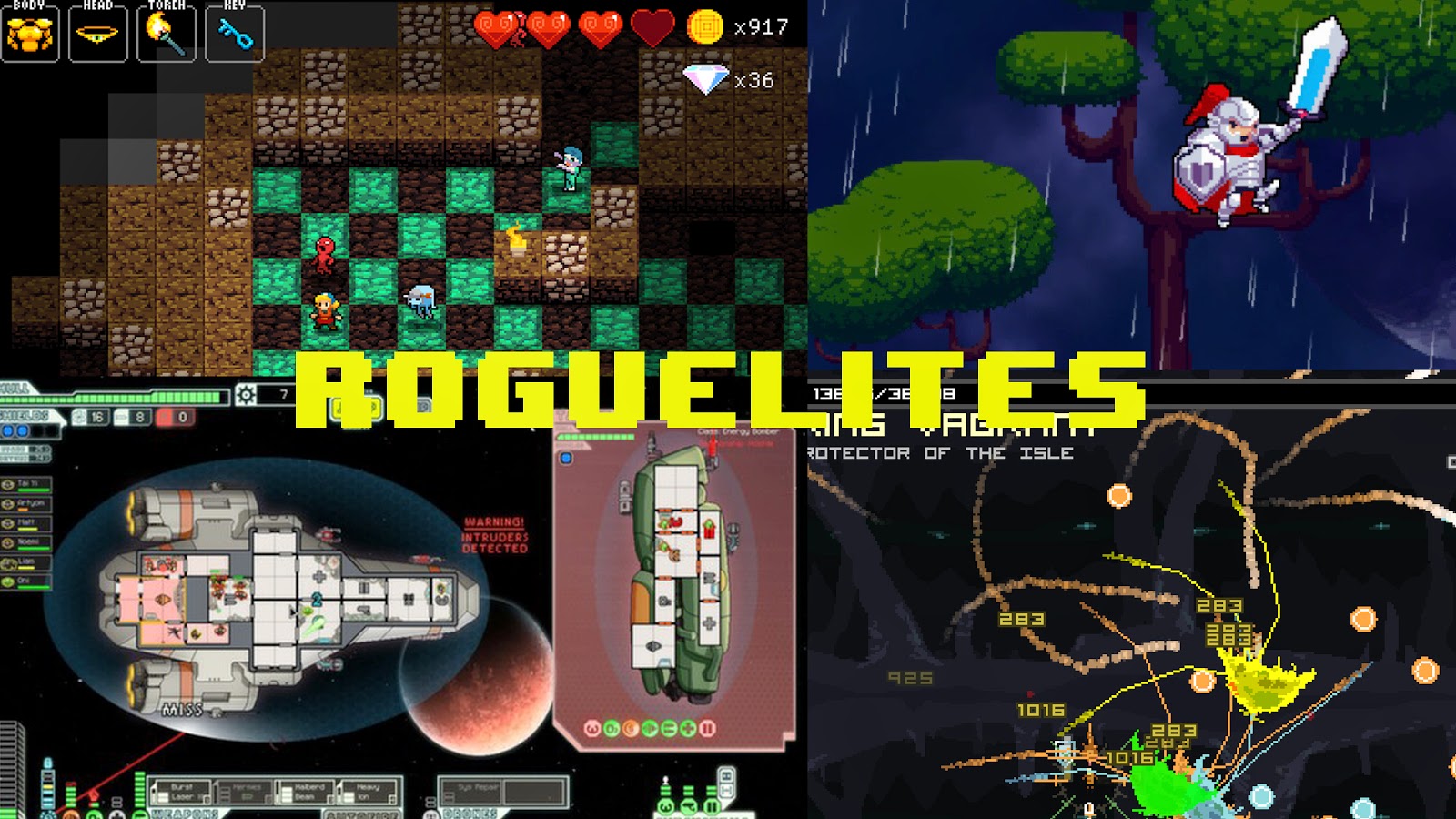In the beginning, there was Rogue, written circa 1980 by a couple of UC students messing around on the school's mainframe after hours. Rogue was not the first dungeon-crawling video game to be inspired by D&D, but it became an instant classic in large part because of its core innovation:
One of the things we wanted to do was create a game we could enjoy playing ourselves. Most of the existing adventure-type games had "canned" adventures -- they were exactly the same every time you played, and of course the programmers had to invent all of the puzzles, and therefore would always know how to beat the game. We decided that with Rogue, the program itself should "build the dungeon", giving you a new adventure every time you played, and making it possible for even the creators to be surprised by the game.
-- Glenn R. Wichman, Rogue developerRogue soon spawned Hack, which spawned Nethack (still being maintained after almost thirty years), as well as a host of other games that are to this day called "roguelikes". The key features inherited from Rogue that mark a game as "roguelike" (defined at the International Roguelike Development Conference) are:
* Randomly generated tile-based levels
* Randomly generated items with unknown properties
* Turn-based movement and combat
* Permadeath
 |
| Nethack, grandson of Rogue. |
Recent years have seen a surge in popularity of "roguelites" -- games that have some of the core elements of a roguelike, such as random level generation, relatively short play times, and permadeath, but often eschewing or tweaking the tile-based dungeon crawl gameplay associated with classic roguelikes. The emphasis on emergent gameplay and procedurally generated content makes roguelites attractive to small dev teams, and short play sessions make them attractive to gamers who prefer dense, bite-sized sessions. Here are a few of those games that I've found myself enjoying over the last year or so.
FTL: Faster Than Light (2012, Subset Games)
 |
| Our life support module is on fire? We don't need that, do we? |
Combat in FTL requires you to manage the condition of your ship at the same time as the health of your crew. An enemy missile might start a fire and a hull breach in your shields module and force you to make tough decisions -- do you send your crew in to try to put out the fire and repair the hull breach, or do you seal it off and let the room depressurize to put the fire out before you deal with the hull breach, knowing that you'll be without shields until the damage is repaired? Do you want to focus your resources on upgrading your ship's weapons, or sacrifice advanced armaments for the ability to deploy boarding parties that can disable an enemy ship from the inside?
FTL runs can be ended in a blink by one lucky shot from an enemy ship, unexpectedly blessed by an improbable find of an overpowered weapon, or both. Every encounter has heavy with potential consequences, and this makes each jump exciting -- will this system be where you find that fierce Mantid crew member you need to round out your crack boarding party, or maybe the rapid-fire ion cannon that will perfectly complement your beam arsenal? Or will your engineer get eaten by giant space spiders, leaving you with nobody to man the engines until you can hire a new one?
Certain achievements in a game of FTL will permanently unlock new options for future games, adding an overall sense of advancement despite each individual game feeling like a fresh start. Different playable races have their own ship models with unique capabilities and strategies, adding replay value even after you've "beaten" the game a few times.
Rogue Legacy (2013, Cellar Door Games)
 |
| Come closer, I want to hit you with my sword. |
Rogue Legacy is a brutally difficult 2D platformer, similar to Castlevania or Metroid. You are an intrepid adventurer exploring a treacherous castle in an attempt to defeat a final boss and restore the family's honor. You will almost certainly die, but after each death the next heir in line will take up the quest, armed with whatever upgrades your family was able to purchase after the previous ill-fated attempt.
Like FTL, Rogue Legacy combines individually short game runs with overall advancement, but the advancement is more linear than branching, and is a requirement to actually finish the game. As you unlock increasingly powerful classes and abilities, monsters that were automatic game-enders when you started will become minor speedbumps, and your runs through the castle will go further and further, slowly inching toward that final encounter.
Risk of Rain (2013, Hopoo Games)
 |
| Stay alive, it says. Like that ain't no thing. |
During any given run you will find and purchase a wide array of randomly available upgrades that will stack upon each other and make you increasingly powerful, and that is where Risk of Rain masterfully leverages the "random reward" roguelike element. Different upgrades combine in ways that are occasionally outright game-breaking, even as the enemies increase in number and power, and there is a tremendous (if sometimes short-lived) feeling of invincibility from building up a combination of powers that let you unleash death across the entire screen.
The persistent upgrade element present in many other roguelites comes into play with increases in the possibilities for random drops. Achievements unlock new items that may then appear in future games (many of them significantly more powerful than the items in the pool you start with), or modifiers that you can choose to apply before starting a new game, such as doing five times the damage while having one fifth the hit points. New characters can also be unlocked, with different characters requiring the use of completely different tactics -- some might be good at evasion, some might be good at crowd control, some at dishing damage out from long range, some at taking it while they dish out powerful melee attacks. Much like FTL's wide array of ships, each new character makes Risk of Rain feel like almost a new game, giving it many hours of replay value despite its simplicity.
Crypt of the Necrodancer (2014, Brace Yourself Games)
 |
| boots and pants and boots and pants and stab and dodge and boots and pants |
Crypt of the Necrodancer is a brilliant "chocolate in my peanut butter" fusion of two completely disparate genres: roguelikes and rhythm games. At its core, Crypt is a classic roguelike, with turn-based action and randomly generated tile-based dungeons where a lucky loot find can make or break you. Its brilliant twist is that the game's turns happen to the insistently pulsing beat of its soundtrack. Miss a beat, and you take no action for that turn, allowing enemies to move and attack as you stumble in place (and probably meet your untimely end). Stay on the beat, and you move at full efficiency, building a score multiplier that increases your loot drops and makes you more powerful.
Each monster has its own pattern of movement and attack, and as you learn the patterns, fighting becomes a dance of carefully timed steps. Skeletons advance toward you on every other beat, and so if you alternate between attacking and backing away, you can kite them effortlessly. Slimes move in a repeating pattern, so the trick is just not to stand where they're about to move. Simple enough if there's just one enemy -- now keep track of where each one is in its pattern while you're surrounded, and keep moving to that beat or it'll all fall apart in an instant.
As with the other roguelites discussed in this article, Crypt of the Necrodancer has upgrades that persist across sessions, unlocking new items for the loot pool, and new playable characters that present unique challenges on top of the already tough core game. The included soundtrack is excellent, but thanks to built in beat detection software, it can be replaced with music from your own MP3 collection, and the game will automatically sync up to it. For the full rhythm game experience, you can even plug in a USB dance pad and play the entire game that way (I have not yet tried this).
These are some of the games that have been wasting my time recently, but this is by no means a complete catalog of the genre. What are some of your favorite roguelites? Sound off in the comments.
Sam has been playing D&D for almost twenty years but he did not know what a kobold was was until that fateful day in 1980something when he picked a floppy disk with "hack" written on it in magic marker out of the local computer store's bargain bin. He still has yet to find the Amulet of Yendor.
Did you enjoy this article? Follow us on Facebook to get more great content! We have a weekly podcast you can find on our main site. Also follow us on Twitter and Tumblr!

No comments:
Post a Comment